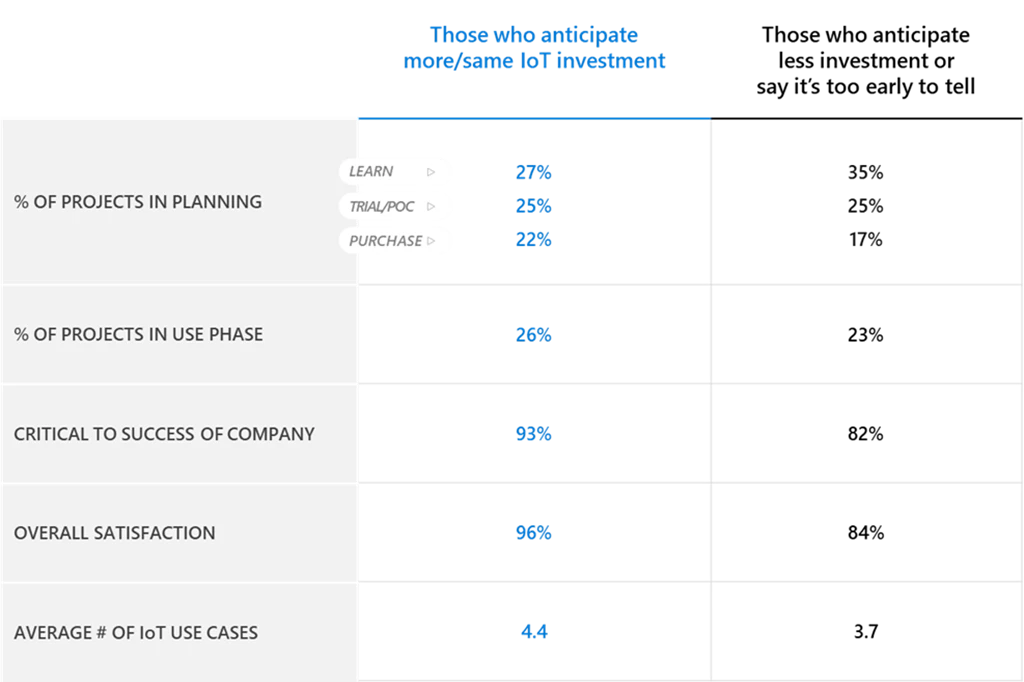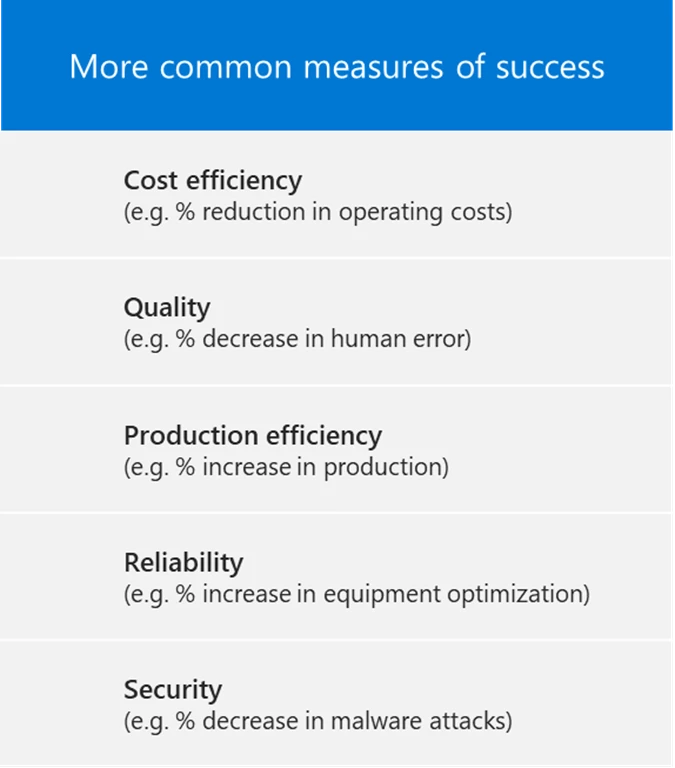If your business is already harnessing IoT, you likely believe IoT is critical to your long-term success. You are not alone. According to our latest annual report, IoT Signals edition 2 released today, 90 percent of decision makers now believe IoT is critical to their company’s success. The last six months have been tumultuous to say the least, however for many business decision makers it has actually accelerated their work towards a connected and secured future.
On our daily Microsoft Teams calls with customers and partners, we often say that it feels like a year’s worth of digital transformation is happening each and every month in 2020. For IoT, that transformation is providing near real-time visibility into physical assets and environments, enabling increased efficiency, reduced downtime, and keeping employees safe as they return to work during COVID-19.
Customers have shared that they are seeking guidance on what we see happening in IoT around the world in industries like Healthcare, Retail, Manufacturing, Oil and Gas, and Power and Utilities, and how other leaders are navigating rapid transformation.
We learned that looking ahead to the next two years, two out of three organizations are planning to use IoT even more than they do today; from connecting and securing factories, to enabling remote patient monitoring, to optimizing supply chains, and thousands of other scenarios. We’re also seeing a monumental shift in companies moving from simply connecting assets (for example manufacturing equipment), to connecting entire environments; the factories, supply chain, distribution network and more. This shift from connected assets to connected environments provides an order of magnitude increase in the value of IoT to a business.
Learnings from IoT Signals edition 2: IoT has become a critical part of organizations’ business strategies
During April, May, and June of this year, we sought to uncover the current and future trends of IoT to better serve our partners and customers around the world to develop their own IoT strategies. In IoT Signals edition 2, we learned from over 3,000 business and technical decision makers, and developers who are currently making decisions for IoT solutions at their organization. Here are five things to know about IoT in 2020:
1. COVID-19 is accelerating IoT adoption.
The study revealed that 91 percent of organizations have now adopted IoT (up from 85 percent last year). COVID-19 is having an undeniable impact on the world around us, and IoT is no exception. While the pandemic has slowed business across the globe, IoT is an area with upward trajectory in the wake of the virus. One in three decision makers say their organizations will increase their investment in IoT due to COVID-19, while another 41 percent say they’ll maintain the same level of commitment. For the few not intending to strengthen their investment, these organizations tend to be in the earlier stages of IoT—and those already behind may struggle to catch up quickly.
“During the coronavirus we had a problem with the return of empty bottles. We didn’t get any back, everybody kept them at home. So we had to get in touch with the glass manufacturers. It wasn’t easy to fill in the gap but we noticed the gap in the first place because of the data that we had through our IoT solution. The manufacturing plant can automatically adapt to increased demand. We also call it the smart factory, we don’t have to control and adjust things so much.”—ITDM, German Beverage Manufacturing
Those who expect to invest the same or more in IoT have fewer projects in the learn phase:

2. Security is integral.
A full 97 percent of IoT decision makers have security concerns when connecting new assets, and data privacy is a top security concern for about half of all organizations. Apart from data privacy, ensuring network-level security and securing endpoints are critical, while security management and managing default passwords is a lower priority.
“Security is extremely important—it’s paramount when we look to implement IoT solutions. We are a big brand, and therefore a big target. Obviously customer data system integrity is very important for us. So we have a very, very talented group of security personnel that are monitoring and developing within IoT all the time. We have different security teams—technical security, physical security, architecture security. It’s an area that we invest in a lot.”—UK Retail ITDM in Fashion Retail
3. AI, Edge Computing, and Digital Twins technologies are becoming mainstream.
However, there is significant room to educate more about these technologies and to test and trial to harness the full potential of IoT. We found that those who incorporate emerging technologies into their IoT solution realize more success with IoT overall, since once the value is proven it’s easier to build buy-in across the organization.
79 percent of organizations adopt AI as part of their IoT solution, and those who do perceive IoT to be more critical to their company’s success (95 versus 82 percent) and are more satisfied with IoT (96 versus 87 percent).
4. IoT projects are evaluated by return on investment, often measured first by how much they move the needle against automation and efficiency goals.
Reduction of operating costs and production efficiency stand out as key benchmarks for determining whether IoT has achieved success—even more so than the number of IoT projects or direct impact on revenue. Not surprisingly, organizations are also adopting IoT as part of a broader culture change to lead new investments for safety and security, rising three spots from IoT Signals edition 1 to the number one reason for IoT adoption in 2020.
Productivity is a top benefit of IoT (79 percent), specifically operations productivity (54 percent) and employee productivity (47 percent). In addition, the top uses of IoT include operations optimization (47 percent) and employee productivity (43 percent).

“We have to prove the impact of IoT to demonstrate the value. If we can explain how IoT helped prevent a hundred thousand truck rolls this year, then ascribe a cost to every single one of those, that’s when we show impact to the bottom line. And on top of that, I’ve got a hundred thousand customers that didn’t wait for an hour or more. In each of those cases we immediately started to triage with customers versus making them wait.”—US Energy ITDM in Power and Utilities
5. Internal resourcing and complexity continue to be top challenges.
While budget constraints can hold back the pace to progress from testing, through proof of concept, and into full use stage, IoT solutions will truly succeed when solution implementers gain deep internal alignment. Scaling an IoT solution presents a formidable shift for organizations which can create internal systems and technical obstacles. Those who adopt IoT as part of a broader culture change and prioritize investing in the right staff are well positioned to overcome barriers sooner.
“We had a lesson learned and realized we weren’t really going to be ready to go to market when we thought. There was more build to be done as we started to use the tool and started to realize—how do we manage this data?”—US Healthcare provider ITDM in Blood Labs
Interested in developing with Azure IoT?
If you’re interested in developing with Azure IoT there has never been a better time to reach out, find a partner, or build a solution to accelerate your business with IoT. When IoT is a foundational part of your transformation, we’ve seen the positive effects it can have on productivity, growth, safety, customer experiences, and much more.
We are committed to helping you turn your vision into reality with secure, scalable, and open edge-to-cloud solutions.
- Develop with choice: Simplify building open and flexible IoT solutions quickly, on your terms.
- Secure data everywhere: Trust your data estate is secure from endpoints to the cloud.
- Power the edge: Seamlessly move your AI workloads and business intelligence to the edge.
- Prepare for future innovation: Integrate continuously enhanced data, AI, mixed reality, and analytics solutions.
- Scale globally: Grow effortlessly with the largest IoT ecosystem to unlock global scale.
Download IoT Signals edition 2 and learn more.
